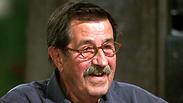
Günter Grass. Decided to break the sulence with an anti-Israel poem
צילום: GettyImages
Günter Grass, the preacher who forgot his own past
Op-ed: Only three years before his death, the writer who was raised on anti-Semitism before and during Nazism finally broke free of the chains of the past and was able to express his real views about Israel – just like his country, Germany.
There isn't a single person whose life reflects Germany's story in the past 100 years in a clearer manner than Günter Grass – the writer, artist, political activist, who was active against the remains of Nazism in Germany and in the world after World War II, but forgot to admit that he had served in the Waffen-SS (Adolf Hitler's armed SS force).
Grass became the supreme preacher of the Social Democrats in Germany. With his sharpened tongue and pen, he attacked anyone he suspected of holding nationalistic and fascist views. But he agreed to reveal his own past in the service of Nazism only several years before his death, when his secret was anyway about to be exposed.
He couldn't remember when he found out he had been recruited to the Waffen-SS. He couldn't remember if he did it willingly or forcibly, and he mainly couldn't remember what had happened during his military service.
What he could remember, with certain longing, was the fact that "there was something attractively European about the Waffen SS; its volunteers included Frenchmen, Walloons, Dutchmen, Norwegians, Danes, and even some neutral Swedes, all battling on the Eastern Front to 'save the West from the Bolshevist flood.'"
In an interview he gave Israeli literature researcher Shimon Sandbank in 1971, Grass said that "whoever decides to include an SS man in his book has to allegedly like him, infiltrate him, learn to understand him, in order to perceive the side in him that was tempted to commit a crime. One can only fight fascism by understanding it from its core, not by demonizing it." Grass just forgot to mention that he had been there and personally knew what he is talking about.
Grass visited Israel twice: In 1967 and in 1971. And just like he preached to the Germans, he preached to the Israelis as well. He was angry at David Ben-Gurion's support for the founder of the New Germany, statesman Konrad Adenauer, who included many Nazis in his administration. And of course, he was angry about the occupation.
In an interview he gave me about a decade ago, he stated that "the Israelis – and the Germans, for various reasons – should be presented with the following question: Have you learned anything from history? The unfortunate answer is no."
Exactly three years ago, Grass decided to break the silence which really distressed him all those years: In his anti-Israel poem, "What Must Be Said," which was defined by many as anti-Semitic, he accused Israel of seeking to annihilate the Iranian people and threatening world peace.
The cat was out of the bag. Grass, who was raised on German anti-Semitism before and during Nazism, finally broke free of the chains of the past and was able to express his real views about Israel. Just like Germany, his country.










